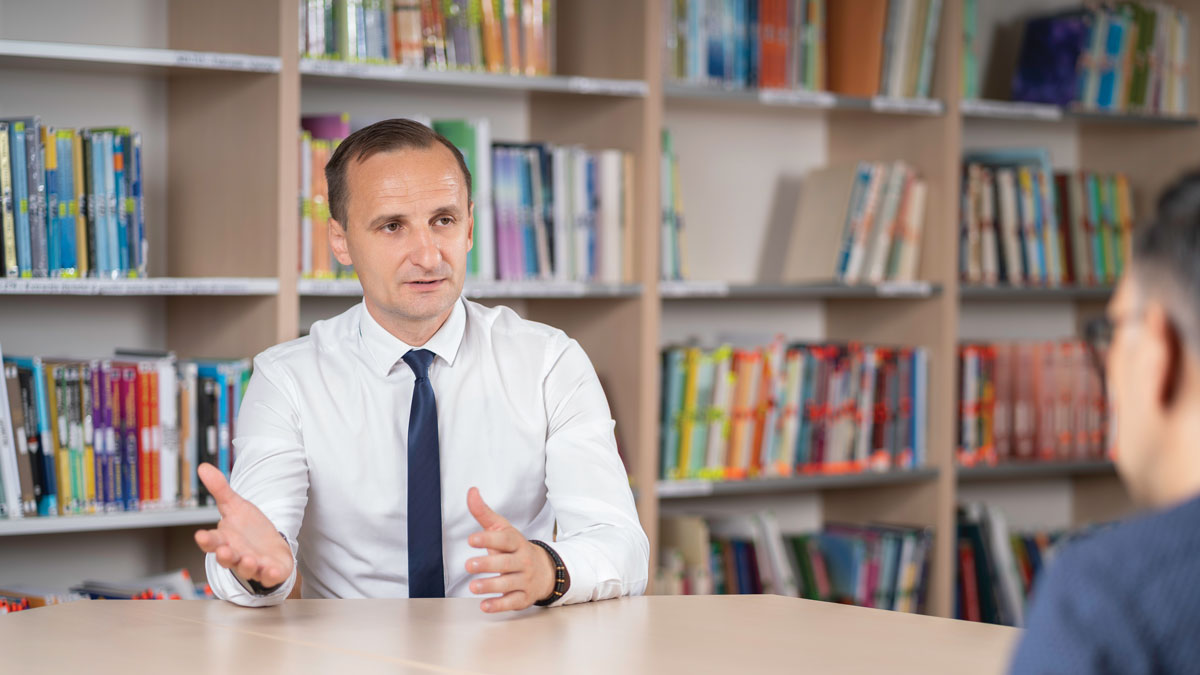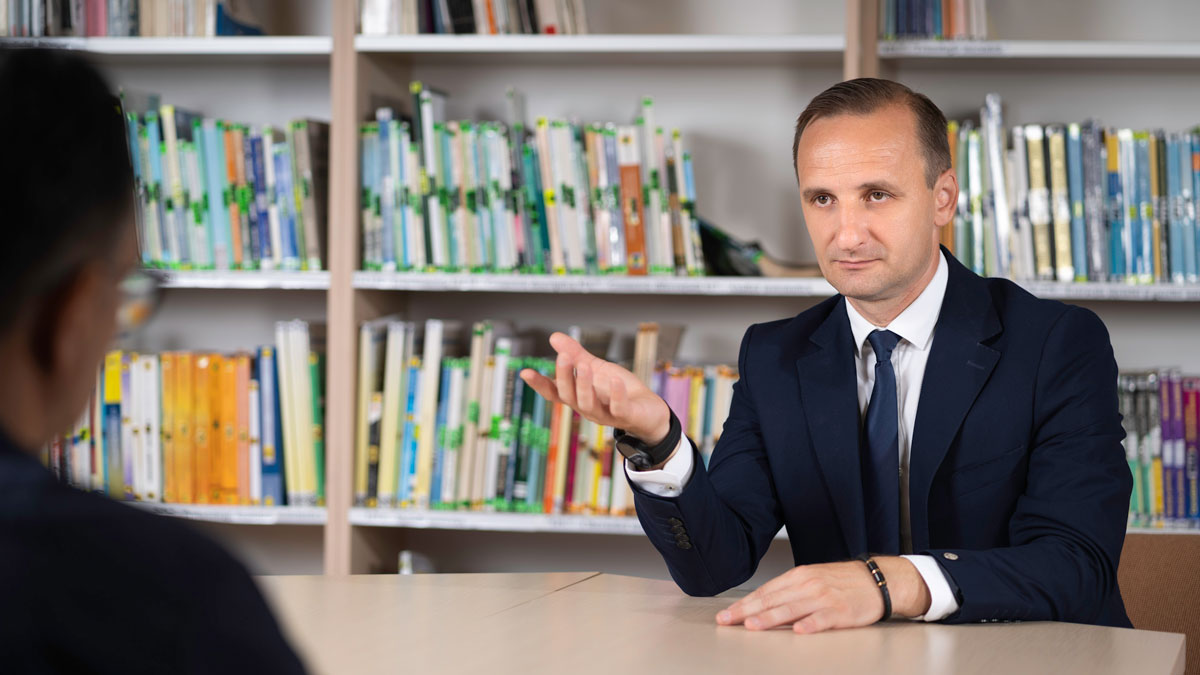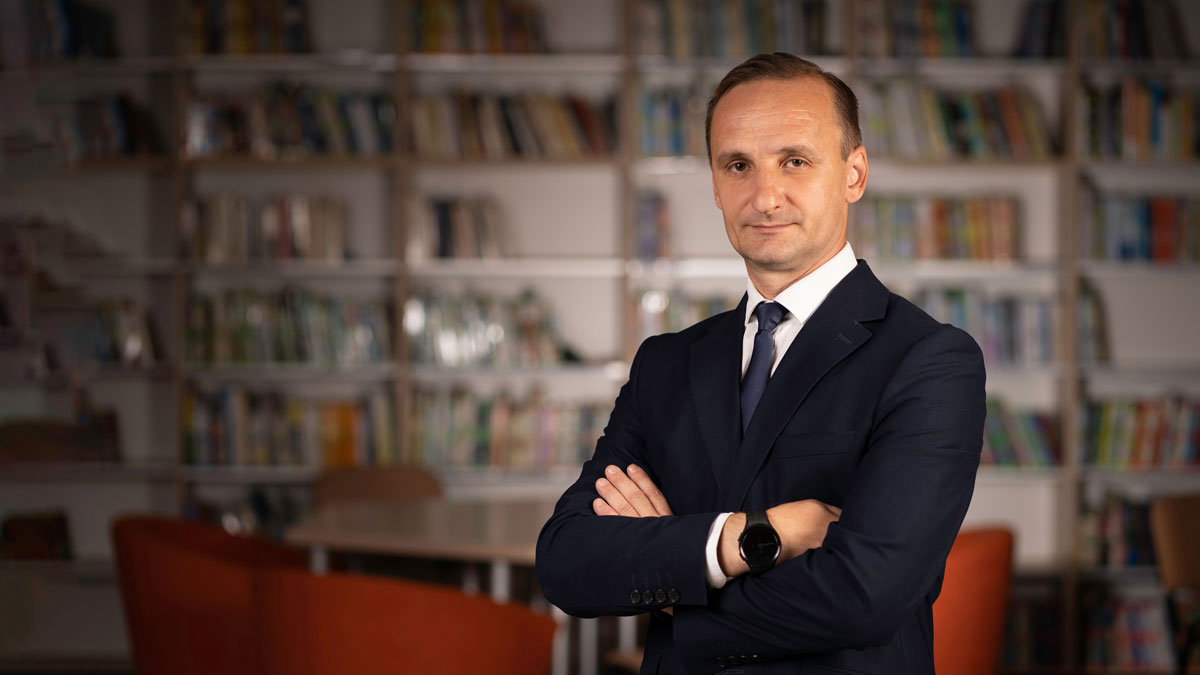PhD Associate Professor Eng. Alin Dinita, Rector of the Petroleum-Gas University of Ploiesti: Looking for a Sustainable Future
A state-owned higher education institution with a rich tradition and outstanding results not only in Romanian higher education, but also abroad, the Petroleum-Gas University (PGU) of Ploiesti is continuously reinventing itself, adapting to European Union regulations and global trends for a sustainable future.
Together with the Rector of the Petroleum-Gas University of Ploiesti – PhD Associate Professor Eng. Alin Dinita, we discuss the main institutional development directions of the strategic plan, the activities and measures undertaken to increase international visibility, as well as the technologies of the future for a cleaner environment.
You have recently been re-elected as the head of the Petroleum-Gas University of Ploiesti, an institution with a rich tradition and prestige recognized beyond Romania’s borders. What exactly does this job entail and what are your responsibilities as Rector?
Alin Dinita: In a landscape where education meets the energy of the future, the rector of the Petroleum-Gas University of Ploiesti plays a monumental role in shaping the destiny of students and the academic community. This position combines myriad responsibilities, but also tremendous opportunities to change students’ lives and to shape and adapt the energy of the future.
The responsibilities of the rector who oversees a university that has achieved 75 years of performance in education and research are not mere administrative duties; they are deeply human, personal and professional commitments. The rector must be involved every day to ensure that every student who crosses the threshold of the university leaves not only with knowledge, but also with a deep sense of responsibility and hope for Romania’s future. Every graduate becomes a story of PGU’s dedication and passion for excellence!
Above all, the PGU Rector is a symbol of hope and resilience. In the face of economic, social and technological challenges, the rector must remain dedicated, guiding the university through difficult times with a clear vision and an unwavering commitment to quality and innovation. Attention to detail, compassion for the academic community of teachers, administrative staff and students, and a desire to see the university thrive in a dynamic and expanding world are the main goals of a rector.
The office of rector is not just a title or a position of power; it is a commitment to serve, inspire and build. Every day brings new challenges, but also new victories, big and small, the main objective is for the Petroleum-Gas University of Ploiesti to continue to perform in education and research, proudly carrying its 75-year tradition of excellence and innovation.
Our university focuses on developing and preparing for the challenges of the educational system to adapt to the requirements of the European educational system. In the current context, it is essential to constantly adapt to changes in the labour market so that we can prepare students for the jobs of the future. By developing a coherent vision, we aim to provide companies with well-prepared graduates who can live up to future expectations and needs.
In addition to academic preparation, creating a sustainable and attractive image of the university is particularly important. In the current legislative context, our success depends not only on the number of students enrolled, but also on the quality of graduates. Through the quality of education offered and continuous adaptation to educational and market needs, we aim to ensure a positive and sustainable image of our education system, while promising innovation and vision for the future.
The position of rector of PGU is a very important one and involves several responsibilities and duties that are essential for the proper functioning and development of the institution. The rector needs to develop and implement a long-term strategic vision to guide the university towards academic excellence and top research. This involves identifying and capitalizing on academic and research opportunities, as well as adapting quickly to new trends and requirements of the education market and the energy industry.
One of the main responsibilities of a rector is to oversee and coordinate the academic activities of the university, ensuring that all study programs are of high standards and relevant to the current and future needs of companies. This involves working with deans, department heads, academics and business representatives to define and implement innovative curricula and courses.
Being a university specializing mainly in the field of oil and gas, but also having a component of Economic Sciences and Letters and Sciences, the rector must promote and support the development of quality scientific research. These include attracting funding for research projects, encouraging partnerships with industry and other academic institutions, and promoting collaborations.
The rector must oversee quality assurance processes for all programs and activities of the university, ensuring that the university meets national and international standards of excellence. This includes monitoring academic results, evaluating teaching and research performance, and implementing continuous improvement programs.
In an ever-changing industry, promoting innovation and advanced technologies is crucial. The rector must support initiatives that lead to the development and implementation of modern technological solutions in curricula and research projects to keep the university at the forefront of oil and gas education and research.
Creating and promoting an inclusive and diverse academic environment is essential for the harmonious development of the university. The rector must ensure that all students and staff, regardless of their background, have equal access to education and research opportunities, and that they feel valued and respected.
In fulfilling these responsibilities, the rector of PGU plays a crucial role in maintaining and advancing institutional excellence, ensuring that the university continues to contribute significantly to education and research, and to respond effectively to future challenges and opportunities, preparing well-equipped students for the challenges of the future and contributing to the development of knowledge and innovation nationally and internationally.

You are, nevertheless, a young professional, if we refer to the average age of academics in general and in this case. How do you combine being an academic professional and a manager and how hard is it to run a university?
Alin Dinita: As an academic professional and manager of PGU, I bring my experience and expertise both to the chair and to the boardroom. The combination of 20 years of teaching experience and almost 8 years of university management encourages me to approach institutional development from a comprehensive perspective, integrating the detailed knowledge of my specialized field with leadership and management skills. I believe that combining these essential aspects allows me to innovate in education, support academic growth and lead the university towards excellence in a holistic and efficient way.
At only 46 years of age, I, Alin Dinita, Rector of PGU, believe that I represent a new era in academic leadership – an era defined by energy, innovation and a fresh vision of education and research. My youth is not a hindrance, but a driving force that brings a new spirit and bold perspectives to the university. My energy and enthusiasm are reflected in my ability to inspire and mobilize teams, implementing meaningful change effectively and with vision for the future.
In innovation, I am guided by the words of the famous Professor Albert Einstein: “Imagination is more important than knowledge. For knowledge is limited, whereas imagination embraces the entire world, stimulating progress, giving birth to evolution.” With a modern outlook, I am driven to introduce the latest ideas and technologies, from digital learning to sustainable research projects, adopting a mindset that is in tune with today’s dynamics.
The close connection with the students of the university allows me to understand their concerns and aspirations, which are essential to create a more inclusive and above all empathetic educational environment. I encourage them to develop their own innovative ideas, supporting them in their intellectual and professional development. This closeness makes interpersonal relationships stronger and more authentic, cultivating a colourful, vibrant and lively academic community.
My experience so far allows me to build a solid and dynamic vision for the university. My commitment to excellence and innovation is unwavering, guiding me to implement strategies that support both academic performance and the personal development of students and teachers.
My enthusiasm and dedication are sources of motivation for the whole university community. I inspire not only students but also teachers and administrative staff, creating a positive and productive working environment. Together, we turn challenges into opportunities, cultivate excellence and continuously innovate. By preserving the legacy of excellence that PGU offers us, we are poised to educate generations of students able to meet all global challenges, while remaining inspired by the power of imagination and dedication to knowledge.
Academic/university management is different from management in private companies because it has more components than the common performance objectives pursued in the private sector. An important aspect is the differentiated motivation of the teaching staff towards teaching and research performance, which entails success at all levels of university development. Challenges arise every day in other areas: administrative, legal, non-teaching.
Running a university is a complex and challenging task, involving managing a diverse and dynamic academic environment. A rector must manage a variety of issues, from academic programs and research to relations with students, teachers and the local community. Managing financial and human resources effectively, adapting to continuous change in education and research, and maintaining academic relevance and standards of excellence are just some of the challenges a rector faces. Skills such as effective communication, strategic decision-making, innovation and the ability to build strong interpersonal relationships are essential for effective management. In addition, adaptability and resilience are crucial qualities needed to cope with unpredictable challenges and to ensure the long-term success of the higher education institution.
Collaborating with a dedicated and talented team is one of the most rewarding parts of being rector of this university. Working with motivational teachers, committed administrative staff and eager students brings fulfilment and joy. Watching the team develop in ways they never thought possible, reach their full potential and contribute to the university’s success is deeply satisfying. In these moments, the rector understands that the real magic of university management lies in the ability to inspire and guide a diverse and talented team towards academic and professional excellence.
I would like to extend a sincere and warm ‘thank you’ for all that PGU has offered me throughout my academic and managerial journey. With every step I took through the corridors of the university, I was accompanied by knowledge and opportunities. I would like to thank for the dedicated teachers, for the warmth and understanding that the university has given me and for the constant challenges that have helped me to grow and develop.
It is with these warm and grateful thoughts that I thank you, dear University, for all that you have given me and for the influence you have had on my formation, first and foremost as a human being.
The United Nations has defined sustainable development as development that meets the needs of the present without compromising the ability of future generations to meet their own needs. What are the main activities that define the PGU strategy in this context?
Alin Dinita: Sustainable development is a concept for which we have worked hard to ensure that the principles of sustainability are embedded in every aspect of our university work. We are committed to educating and inspiring both teaching and administrative staff and students about the importance of protecting the environment and adopting sustainable practices in all aspects of our university life.
We consume resources to inform members of the academic community about the impact of our activities on the environment and our common future. Our educational efforts aim to raise awareness and promote environmental and sustainable values, providing knowledge and practical tools for sustainable behaviour.
Through our programs and initiatives, we promote the implementation of sustainable practices on campus and encourage the active participation of all members of the university community towards a cleaner, healthier and more balanced environment. Together, we are working to reduce our environmental footprint by promoting recycling, responsible use of resources and energy efficiency in all aspects of our activity.
Through these actions and our collective commitment to sustainable sustainability, we strive to create an educational environment that not only encourages, but actively practices the environmental and social values essential for a better and more balanced future. In this spirit, we are dedicated to the mission of building a strong and responsible academic community concerned with promoting sustainable and planet-friendly living.

What are the most important programs/projects currently running within the university and with which partners do you collaborate?
Alin Dinita: In view of the activities related to the implementation of the sustainable strategies presented above, in the period 2022-2024, PGU initiated and obtained funding for the implementation of an innovative project that aimed not only to reduce heating costs for the campus, but also to develop a future sustainable solution to reduce the consumption of fossil fuels.
The project involved the implementation of a hybrid energy efficiency system that utilizes the energy produced by heat pumps and is integrated in the PGU Ploiesti campus building. The system includes 10 heat pumps that will provide a thermal capacity of 690 kW, together with heat energy recovery from flue gases generated by gas boilers in the university’s heating plant. This approach provides an additional source of energy, with each heat recovery unit having an output of 150 kW thermal, helping to recover energy that would otherwise have been lost to the atmosphere.
The total value of the project was EUR 1,594,670, representing EUR 1,355,000 of Norwegian funds, co-funded by Prahova County Council (EUR 239,400), and the contribution of PGU Ploiesti is EUR 1,670.
Adapting to the requirements of the labour market and its dynamics, through the project ‘Mehedinteanu Petroleum Academic Consortium – PH01CAMP’, Prahova County Council invests almost RON 150,000,000, through a NRRP project, for the construction of a university campus in Ploiesti. This campus will include accommodation facilities, sports infrastructure, cafeteria, relaxation areas, state-of-the-art laboratories and administrative buildings. The project is estimated to be completed by June 30, 2026. The consortium is composed of Prahova County Council, which is leading the project, PGU, Lazar Edeleanu Technological High School Ploiesti and OMV Petrom.
Investments in this integrated campus for vocational and technical education will strengthen relations with the economic and social sector, promoting the diversification and stimulation of dual vocational education. These investments will support the development of the professional training infrastructure both on campus and in partner companies, thus helping to strengthen the training capacity of future specialists.
PGU continues its modernization program with the support of the NRRP funding. In July 2024, two NRRP grant agreements were signed for the modernization of indoor recreation areas, cafeteria and accommodation facilities in dormitories for a total amount of RON 15,565,277.39. These initiatives are meant to achieve three major objectives that will benefit the students of PGU Ploiesti: modernization of the recreation and reading areas, canteen facilities and dormitory accommodation.
The creation of leisure facilities for students and a podcast studio, funded by competitive projects offered by the Ploiesti Municipality, are valuable investments that serve to promote the image and experience of students. These developments are motivated by the desire to provide a relaxing and stimulating environment that supports well-being and social interaction among students, encourages creativity and free expression of ideas, promotes mental health and emotional balance, supports the development of communication and collaboration skills needed in both academic and professional contexts, and provides opportunities for personal and professional growth, thus contributing to a dynamic, creative and empathetic academic community.
In the fall of 2024 we will deploy a photovoltaic power plant with an installed power of about 140kW, with an investment of about EUR 100,000 EUR from OMV Petrom, having as main objectives: after amortization of initial costs, the energy produced by the solar panels is practically free of charge and helps the university to keep its budget within sustainable limits; integration into the university’s study and research programs, students and researchers can study the system performance, develop innovative solar technologies and explore ways to optimize energy efficiency; by investing in solar energy, the university increases its energy independence and becomes less dependent on traditional sources of electricity such as fossil fuels, this increasing the university’s resilience to disruptions in the electricity supply.
The implementation of a training centre on CNC (Computer Numerical Control) simulators at the university represents a significant opportunity to develop students’ technical and practical skills in the field of automated mechanical processing. This centre will provide the opportunity for both students and trainees from outside PGU to learn and work with state-of-the-art equipment, developing their skills in programming CNC machines using simulators. This training centre, which will be realized with an investment of USD 80,000 secured through a sponsorship from the TIMKEN Foundation, will facilitate practical learning, experimentation with different machining technologies and the acquisition of essential skills to be prepared for the demands of modern industry. The implementation of a training centre on CNC simulators can be an important step towards providing relevant, up-to-date education geared to the real needs of the job market in the machining industry.
The renovation of the classrooms through the sponsorship of about RON 300,000 offered by commercial banks (BRD, BCR, Raiffeisen, Transilvania) is certainly a significant step in improving the university infrastructure. This strategic partnership between the university and commercial banks highlights the joint commitment to the development of education and academia. By modernizing these classrooms, we are building a more comfortable, attractive and conducive learning environment for students and teachers. The improved facilities and conditions will contribute to increasing the quality of learning, facilitating the learning process and stimulating the active involvement of participants.
The commitment and contribution of the General Manager of Transgaz, Ion Sterian, to the ongoing projects at our university are admirable and commendable. Through his involvement both in the renovation of the university infrastructure and in co-opting university specialists for major projects related to CO2 capture and the use of hydrogen as an alternative energy source, Ion Sterian demonstrates a high level of expertise and passion for innovation and sustainability.
Recognizing Ion Sterian’s efforts and contributions not only inspires colleagues at the university, but also promotes collaboration and excellence in areas of vital importance for the future of the environment and sustainable energy. Through his dedication and patriotism, Ion Sterian supports the academic community towards a sustainable and beneficial development for society.
How do you see the competition at national and international level and what measures are you taking to increase the visibility of PGU at European/global level?
Alin Dinita: Smaller universities face strong competition both nationally and internationally from bigger and better-ranked universities. This can generate pressure to highlight distinctiveness and excellence in specific areas to attract students, teachers and funding. However, its small size may give the university the opportunity to specialize and focus on certain research areas or academic programs, thus becoming a recognized centre of excellence. By expanding collaborations and strategic partnerships, through innovation and adaptability, the university can react more quickly to changes in the academic environment and maintain a competitive edge in fierce academic competition. These strategies can help to strengthen the position of the smaller university both nationally and internationally, enhancing its reputation and impact in the global academic community.
I believe that the visibility of the university stems from our academic performance, the more we assert ourselves nationally and internationally, the more PGU’s visibility will increase. The University has a strategy for development and performance incentives that is disseminated at the level of each faculty/department, we need clear and measurable objectives that we achieve step by step, one person at a time, this strategy being managed by the newly established University Development Centre within the university.
In order to increase PGU’s visibility and impact both nationally and internationally, it is important to implement a number of strategic measures: strengthening collaborations with companies in the oil and gas industry and in the fields of economics and letters and sciences to ensure the relevance of study programs, facilitating internships for students and promoting knowledge and technology transfer; developing international exchange programs such as ERASMUS for students and teachers that would enhance cultural diversity and strengthen the reputation of the university globally; organizing and participating in international academic conferences and events that provide opportunities for collaboration and exchange of experiences with other oil and gas professionals.
Through the implementation of these measures and a well-thought-out promotion and development strategy, PGU will strengthen its position both nationally and internationally, attracting talented students, prestigious teaching staff and visibility in the global academic community.
What are the sources of funding for the activities carried out by PGU – education, scientific research, others?
Alin Dinita: Universities rely on various sources of funding to ensure their long-term functioning and development. The core funding, which comes from the state, covers 75% of essential expenses such as staff salaries and operational costs. However, to cover additional needs and support growth, universities are looking for alternative sources of funding.
Funding of state-owned higher education institutions from public funds is carried out from the budget of the Ministry of Education and focuses on three main directions: Core funding – covers the main costs related to the teaching process and is awarded through study grants (tuition figures). The objective is to support priority fields of study that contribute to the sustainable and competitive development of society; Additional funding – is granted to stimulate excellence in institutions and study programs, both in state and private universities; Institutional Development Fund – is addressed to the best performing higher education institutions in each category and is allocated according to competitive criteria based on international standards, encouraging continuous improvement and the achievement of high standards of quality and excellence.
These funding directions reflect efforts to enhance the quality and competitiveness of higher education, ensuring adequate financial support for the continued development and progress of academic institutions.
Increased funding is often obtained from the sale of publications, patents or other commercial activities as well as from research and service agreements with companies in the business environment. Foreign investment can bring substantial financial resources, facilitating infrastructure development, equipment modernization or collaboration with international institutions on research projects. Attracting sponsorship is another important funding strategy for universities. By collaborating with private companies, foundations or other interested organizations, universities can obtain financial support for various projects, academic programs or research.
Effective management of these diverse sources of funding is essential to ensure the sustainability and prosperity of the university. By diversifying sources of income, prudently managing resources and developing strategies for attracting funding, PGU can strengthen its academic excellence, cutting-edge research and contribution to the progress of humanity.
How attractive is the oil and gas industry to young people? Compared to previous years, what is the level of interest, both from Romanians and foreigners, in studying this field?
Alin Dinita: Looking at the current energy infrastructure based predominantly on fossil fuel sources such as natural gas and oil, and the fact that almost everything around us is related to the oil and gas industry, it is obvious that in the medium term our university will be attractive to potential students and financiers. However, it is important to emphasize that the university does not focus exclusively on specific areas of the oil and gas industry.
Although solar and wind energy are expected to be used more than 40% by 2060, hydrocarbons will still be needed for fuel production, especially for aviation. As natural gas is a cleaner-burning hydrocarbon compared to other fuels, it is anticipated that natural gas will be essential for the development of power generation technologies.
However, we also have strongly developed departments within the faculties of Economics, Letters and Sciences, which make a significant contribution to the university’s adaptation to the academic and economic environment of the near future. These diversified and well-established academic facilities reflect our commitment to providing educational programs that meet today’s requirements and project the university as a modern, adaptable and prepared to meet the challenges of the future.
Through the diversity of departments and a focus on varied disciplines, our university aims to prepare students for multiple opportunities in an ever-changing world. It is thus preparing itself as a centre of academic excellence and innovation that aims to adapt and thrive in an increasingly complex and dynamic society.
Student interest in the oil and gas industry can be influenced by a few factors. Attractive career opportunities, such as competitive salaries and opportunities for rapid advancement, can boost interest in the sector. The existence of specialized and relevant academic programs in the field can also attract students interested in the technical and practical aspects of the industry.
Promoting academic excellence, innovation and continuing to support students in their professional development can help to stimulate interest in the oil and gas industry and to produce a future generation of well-trained professionals in this field.
Talking about technological innovation, whereby energy can be produced with a reduced carbon footprint for a cleaner environment, what are the technologies of the future that will ensure this goal is achieved?
Alin Dinita: Investing in clean and green technologies for oil and gas extraction and processing is a crucial direction in efforts to minimize environmental impact and adopt more sustainable practices in the energy industry, thus ensuring an economically smooth transition to the ambitious Fit for 55 and achieving climate neutrality in 2050. Implementing advanced technologies can bring multiple benefits, including reducing greenhouse gas emissions, optimizing efficiency and reducing waste.
Efficient extraction technologies, such as directional or hydraulic drilling, have the potential to reduce environmental impact and optimize the oil extraction process, minimizing resources consumed and waste generated. Low-emission processing technologies also help reduce air pollution and environmental impact. The recovery and recycling of by-products from oil processing can be key to minimizing waste and using resources efficiently. Continuous monitoring and adoption of advanced digital technologies can provide greater process transparency and optimize operational efficiency, helping to reduce risks and improve sustainability in the oil and gas industry.
By investing in these clean and green technologies, the oil industry can move towards more responsible, environmentally friendly and sustainability-oriented practices, strengthening its competitiveness and helping to protect the environment for future generations.
Of course, to achieve a low-carbon energy footprint and contribute to a cleaner environment, the future also relies on advanced technologies such as next-generation solar energy, efficient wind turbines, micro-hydropower plants, nuclear fusion reactors, green hydrogen produced by electrolysis of water with renewable energy, advanced energy storage solutions, carbon capture and storage (CCUS) and smart grids. These technologies provide major benefits by reducing carbon emissions, improving energy efficiency, providing a stable and sustainable energy source, and seamlessly integrating renewables into existing energy systems.
The energy sector, subject to challenges – fluctuating prices, technological developments, a changing legislative and regulatory landscape – is both versatile and flexible. In your opinion, what are the ways to adapt to the dramatic transformations of the energy transition?
Alin Dinita: The energy sector is a complex and crucial area that has evolved significantly throughout history, from Prometheus’ discovery of fire to the challenges and opportunities of the energy of the future. The versatility of this sector can be explored in terms of its evolution and impact on society and the environment.
In its early days, the discovery of fire and the use of natural resources to produce energy was a crucial step in the evolution of humanity, enabling civilizations to progress and develop. Over the ages, the exploitation and use of traditional energy sources such as coal, oil and natural gas have been at the heart of the industrial revolution and economic growth.
Adopting innovative technologies such as advanced energy storage, smart grids or investing in energy efficiency is helping the transition to a greener and fairer energy system. These technological and energy policy developments mark an important shift towards a sustainable and environmentally sound future.
The use of quantum computing in energy can bring several benefits and innovative possibilities. With their ability to simulate materials and complex quantum processes, these computers can support research and development in the energy sector, enabling detailed simulations that would be difficult to perform with traditional computers.
Quantum computers’ ability to optimize electricity grids can also play a crucial role in integrating renewable energy sources more efficiently and improving its distribution. By applying quantum algorithms in network optimization, energy losses can be reduced, and the efficiency of energy systems can be maximized.
In the energy storage sector, quantum computers can speed up the design of batteries and other storage solutions, helping to develop more efficient and better performing technologies. They can also be used in nuclear fusion research, facilitating the complex simulations and modelling needed to advance the field.
As such, the energy sector is constantly redefining its direction and priorities, adapting to contemporary needs and challenges to ensure universal access to energy, support economic development and protect the environment at the same time. From the fire of Prometheus to the energy of the future, the energy sector reflects humanity’s continuous transformation and adaptability in the search for a sustainable and encouraging future.







